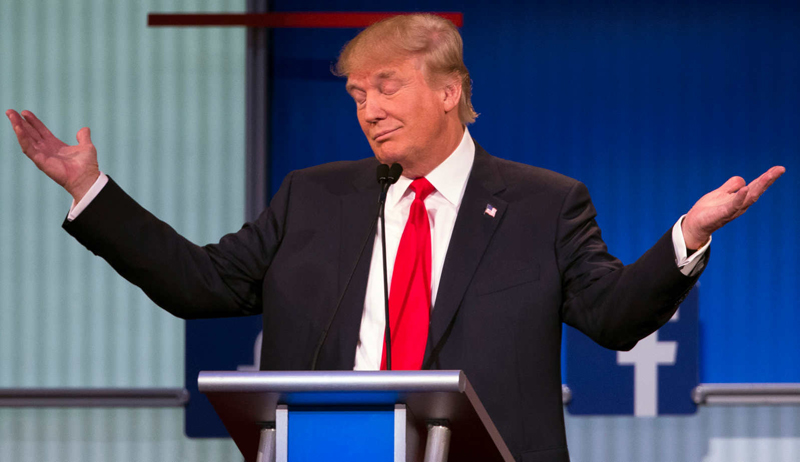
OR

In developing countries the ultra right will use Trumpian logic to successfully belittle democratic and liberal values
With Donald Trump’s triumph in the recent US presidential election we are swamped with commentaries telling why Trump and everything he stands for is bad for the US and the whole world. But as I see it, Trump is not to be feared because he will not be able to even fulfill a quarter of what he pledged on the campaign trail. He has already softened his stances on many issues. Also, let us not forget, American institutions are strong and he won’t be able to bend those to his will overnight. Further, as someone new to Washington, D.C., he first needs to get a hang of how things actually work and by the time he starts acting on his campaign promises—that is if he ever does—it will be almost time for the next presidential election. And that’s what we need to be concerned about the most.
In the next election, if he decides to contest it, Trump will blame the liberals and the institutions for not letting him have his way, just like the politicians do it everywhere. He won’t admit that he won the first term by making promises he fully knew he couldn’t keep.
Then, he will appear even tougher against those who supposedly did not allow him to act on his election promises. Chances are he will be re-elected by the same people who elected him this time. And just like his first term, he will do nothing, because he knows he can’t do anything, to act on his election pledges. The only thing he will accomplish within the next four years or eight years is that he will further radicalize and polarize American politics.
Trump will eventually leave the arena, but his influence will linger and most likely grow after he is out of office. If Trump wins the second term, imagine the Republican candidate in the 2024 election. S/he needs to appear tougher than Trump on immigration, America’s international commitments and engagements, trade, LGBT rights and abortion. S/he will have no other option. You either have to denounce your predecessor as irrational and accuse him of sowing the seeds of something dangerous. Or, to get the votes from the people who voted for your candidate, Trump, in the previous election (s) and sent him to the White House, you keep saying the same things that he did.
If the Republican Party opts for the former course, chances are it will lose because it translates to saying, look we decided on a wrong candidate before, but now we have a more liberal candidate (of course, as things stand, a ‘liberal Republican’ is an oxymoron, so what I mean here is someone less polarizing than Trump). Moreover, it will be insulting your voters to tell them, look, you chose the wrong guy for the office, so choose someone different this time. The Republican Party will not attempt a political suicide by doing so. And that will make things really difficult for the Democratic Party.
The Democratic Party will be forced to review its stances on the issues that differentiate it from the Republican Party. Chances are, to win over Republican voters, it too needs to veer to the right on immigration, economy, America’s international role—and responsibilities—and abortion. The only difference then will be over how one says it. The Republicans will probably keep using crude language; the Democrats will probably say the same things less crudely. But we can be certain that both will be saying the same thing. The Democrats learned it a hard way that what they stand for is what almost half the country does not yet believe in. So either you keep viewing these people as anachronistic and ignore them, or try winning them over by saying the same thing that the other party’s candidate says. After all, it is also a political party and will not want to put its future in jeopardy by alienating the people who can send its candidate to the White House. And this means compromise, or going with the tide, if you will.
The first signs of Trump effect on the US society and politics will not be visible overnight. We will have to wait for that. But we can be certain that when it does show, it will be the end of the US as we know it. As any student of history can tell, nationalism takes time to take root and rightward shift of a society too is gradual at first. But once the momentum builds up, it’s a swift and unstoppable force. Sadly, the US is heading in that direction. Trumpism will effectively weaken the opposition and will even force the opposition to subscribe to it, if it wants to secure its political future.
And why should we in Nepal care about what happens in the US? The answer is that because it will affect us and rest of the world. In the developing countries where democracy is yet to take root and whose institutions are weak, the ultra right will use Trumpism to do away with the democratization and liberalization process. If they can do it in the US, the silly logic will go, why can’t we? In developed countries, it could very well lead to anti-immigrant anti- diversity policies and even breakdown of regional organizations such as the EU, as a recent Economist editorial speculates (The new nationalism, Nov 17). Even a cursory reading of world history is enough to understand that when international organizations fail or when countries start promoting ethnic nationalism, the consequences are grave.
Call it irony of ironies, the country that stood at the forefront of promoting globalization and diversity has embarked on an isolationist and illiberal path. It will certainly affect the way we will be talking about liberalism, regional and international cooperation and diversity throughout the globe.
Let’s be very certain about this. Defeating Trumpism will not be easy, maybe even impossible. The only way to defeat it is to unite against it. But as things now stand, it is easier said than done.
We are living in some very interesting times indeed.
trailokyaa@yahoo.com
You May Like This

Prepare for the longest lunar eclipse of the century, coming up this month
July 2: A total lunar eclipse will rise over the night sky this summer, and it will be the longest... Read More...

Real Madrid coaching team coming to Kathmandu
KATHMANDU, April 25: Coaches from Spanish club Real Madrid will be coming to Nepal to conduct junior football training camp in... Read More...

Coming clean off addiction
Dear Swastika, I am just eighteen years old and study in college. My parents have given me everything I have... Read More...










Just In
- Heavy rainfall likely in Bagmati and Sudurpaschim provinces
- Bangladesh protest leaders taken from hospital by police
- Challenges Confronting the New Coalition
- NRB introduces cautiously flexible measures to address ongoing slowdown in various economic sectors
- Forced Covid-19 cremations: is it too late for redemption?
- NRB to provide collateral-free loans to foreign employment seekers
- NEB to publish Grade 12 results next week
- Body handover begins; Relatives remain dissatisfied with insurance, compensation amount








Leave A Comment